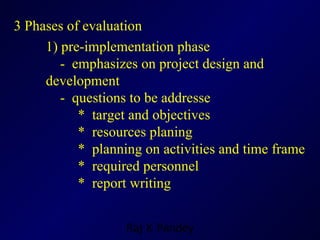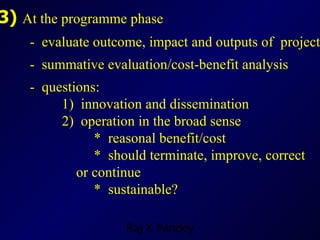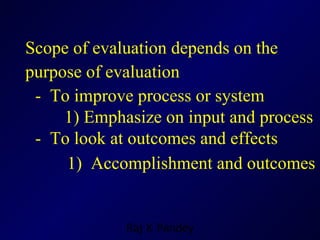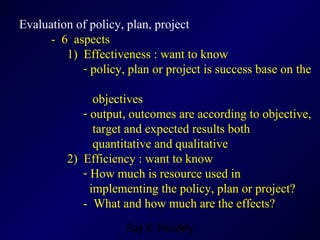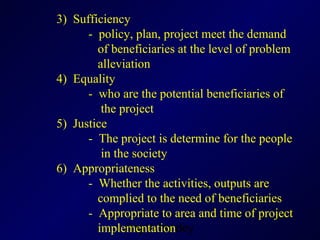13 project monitoring and evaluation
- 1. PROJECT EVALUATION 1. Definition 2 aspects 1) Value Judgement of evaluated subject - A process of judgement of achievement of evaluated subject A judgement of outcome from activity to achieve a certain target - value determination of something
- 2. 2) Information for decision data collection and interpretation of data A process of determination, procurement, presentation of information that useful for decision making - Information gathering and use that information for decision making of projects, i.e., output, process of project.
- 3. 2. Evaluation Research - Base on research design - Data collection, analyze and process of data - Not aim to look for new theory - Aiming to test the application of new knowledge in management and action - Evaluation is a process of information formulation to judge something that leads to a decision making as systematically and with criteria.
- 4. - Evaluation is composed of : 1) Measurement 2) Comparison Measurement is a process of determining status and amount Comparision is a process of using the results from measurement to judge according to standard criteria. Compare between before and after project. - Judgement between actual and plan
- 5. 4. Evaluation Process Measurement Comparison Description Decision = Evaluation +
- 6. Purpose of Evaluation - Identify objective and use of information - Users of evaluation results, evaluation team, planners, implementation team, committee, executive, public, lawyer - The purpose of evaluation is to improve the project management and implementation
- 7. Good Evaluation must have the following information: - How much project objective is achieved. - Cost effective - Effects of the project What should be decided for the project
- 8. 6 Functions of Evaluation 1) Information function - Feedback to improve project 2) Professional function Increase understanding of project objectives and process Success, failure, strength, weakness and recommendation 3) Organizational Function - Analysis of goal, purpose, strength, weakness of organization structure
- 9. 4) Political Function Encourage the participation and benefit between planners and project managers 5) Socio-Psychological Function build up the security of stakeholders 6) Historical Function - Record direction and lesson learn for future project implementation
- 10. Scope and Coverage of Evaluation 1) Internal/External - Internal : by project staffs - External : increase the confidence of objectivity in evaluation process
- 11. 2) Formation/Summative Ongoing evaluation : information to improve process Post-evaluation : aims to sum thing up to look at the achievement of project objectives * Impact * Cost-effectiveness * Outcomes 3) Based on the unit of analysis - participants - project - impact on community
- 12. 3 Phases of evaluation 1) pre-implementation phase - emphasizes on project design and development - questions to be addresse * target and objectives * resources planing * planning on activities and time frame * required personnel * report writing
- 13. 2) During the programme implementation phase - emphasizes on fact finding and effectiveness of project under various conditions - trend analysis * process evaluation * experimental study - questions: * before fully implementation * on-going implementation
- 14. 11. Before fully implementation - project verification V.S. sample of target group - questions: 1) operation is according to the plan 2) quality of output is as expected 3) problems, recommendation for improvement 12. On-going evaluation - check the output/outcome as plan - questions : 1) any changes according to objectives 2) should continue or terminate 3) any improvement required
- 15. 3) At the programme phase - evaluate outcome, impact and outputs of project - summative evaluation/cost-benefit analysis - questions: 1) innovation and dissemination 2) operation in the broad sense * reasonal benefit/cost * should terminate, improve, correct or continue * sustainable?
- 16. 11 steps in evaluation planning 1) review project details 2) set up objectives and indicators SMART S = Specific M = Measurable A = Achievable R = Result Oriented T = Time bound
- 17. 3) Develop evaluation schedule, when and whom data is collected 4) Sampling – for large project 5) Type of data – look at objectives 6) Select and innovate instrument for data collection 7) Data collection plan 8) Data analysis plan – look at objectives 9) Cost estimation 10) Report and discloses information schedule 11) Scope of evaluation
- 18. Scope of evaluation depends on the purpose of evaluation - To improve process or system 1) Emphasize on input and process - To look at outcomes and effects 1) Accomplishment and outcomes
- 19. Full Project Evaluation is composed of 5 aspects: - Context - Input - Process - Product - Effect/Impact - Which aspect depends on time frame of evaluation
- 20. Pre implementation evaluation - For project planning : compose of 1. Context evaluation - economic, social, politic - problem and community’s needs - target group 2. Input evaluation check adequacy of input and quality to be used in project operation appropriate technology - a feasibility of work plan, financial plan and staffs
- 21. Formatives/Ongoing Evaluation - Evaluate process - Is the operation progress? - Is input appropriate? - Does activity contribute to the achievement of objective? - How much is the outcome/effects? - What is the strength and weakness? - What is the obstacle? - The results will lead to the activity, process improvement
- 22. Post/Summative Evaluation - Look at product after project completion * whether objective is achievable, as well as target * whether the project is success according to the plan - Evaluate after a certain period of project completion * Impact evaluation * Output – outcomes * Both positive and negative impact - Evaluation models : CIPP, CIPOO, CIPPI
- 23. Evaluation Components : 2 aspects 1. Contents of evaluation scope or components objectives questions indicators 2. Methodology of evaluation evaluation design source of data data collection, mean of verification, tools data analysis - evaluation criteria
- 24. Essential components of evaluation design - purpose of evaluation - users - objectivity - time bound - resource available
- 25. Evaluation of policy, plan, project - 6 aspects 1) Effectiveness : want to know policy, plan or project is success base on the objectives output, outcomes are according to objective, target and expected results both quantitative and qualitative 2) Efficiency : want to know How much is resource used in implementing the policy, plan or project? - What and how much are the effects?
- 26. Efficiency of policy, plan or project is 2 folds 1) Technological efficiency - Least cost to produce outputs or outcomes 2) Economic efficiency - The relationship between cost and benefit - Look at the increase of outcome per unit of investment - Decrease the cost per unit of outcome - Look at the effort/input and output - Measure in financial term
- 27. 3) Sufficiency - policy, plan, project meet the demand of beneficiaries at the level of problem alleviation 4) Equality - who are the potential beneficiaries of the project 5 ) Justice - The project is determine for the people in the society 6) Appropriateness - Whether the activities, outputs are complied to the need of beneficiaries - Appropriate to area and time of project implementation












